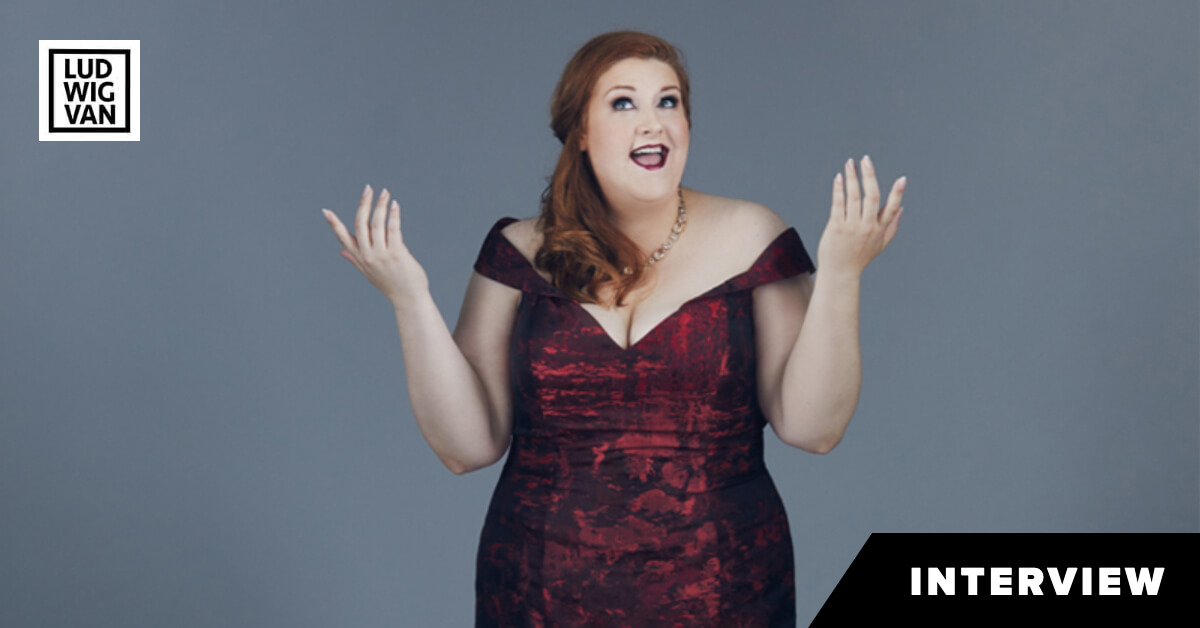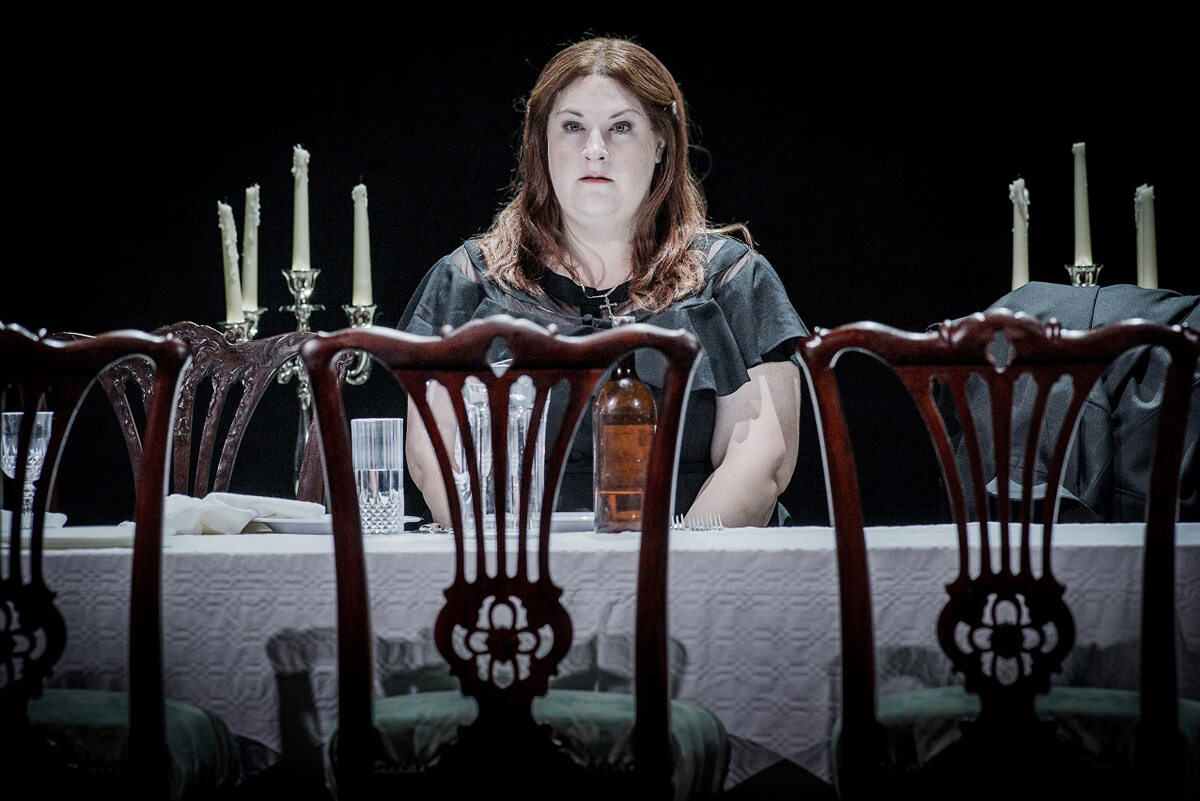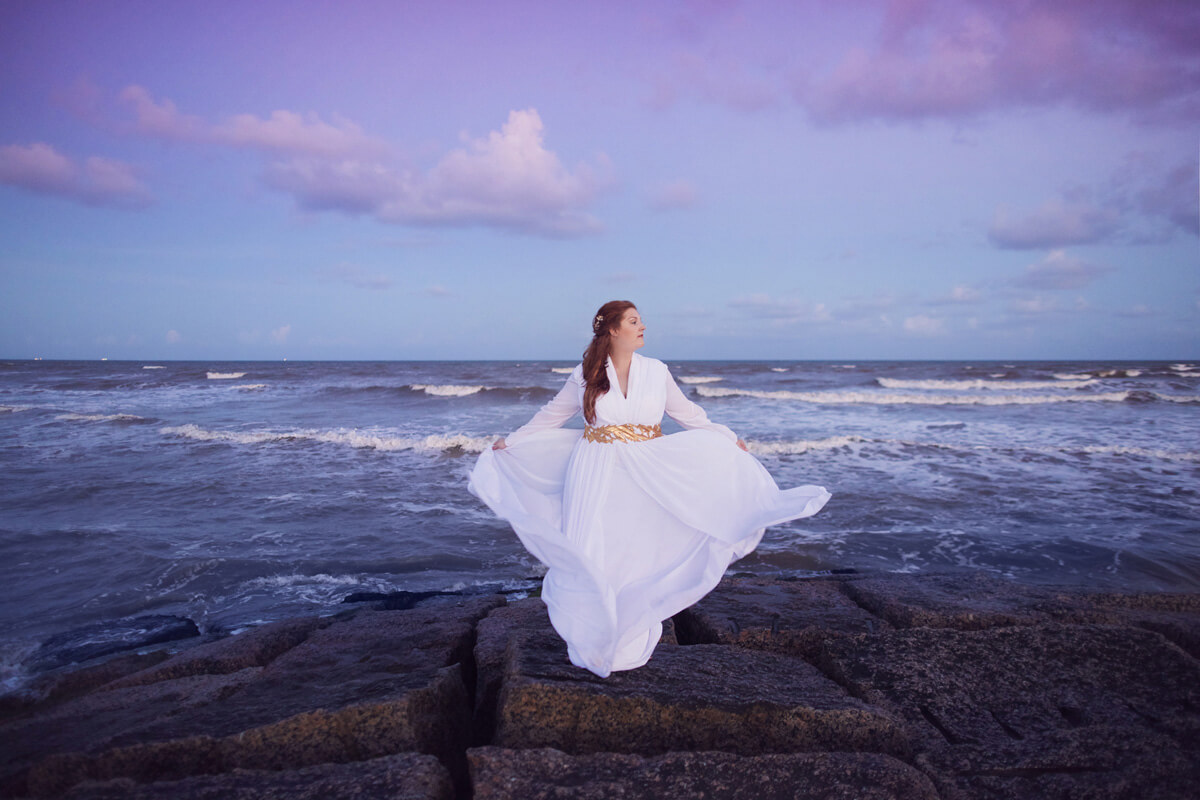The down-to-earth American soprano Tamara Wilson with the big, gleaming voice reflects on her phenomenal yet unexpected career.

Since her breakthrough in 2007 replacing an indisposed Patricia Racette as Amelia in Un ballo in Maschera at the Houston Grand Opera, the American soprano Tamara Wilson has enjoyed an extraordinary career trajectory that is the envy of many of her peers. She is that rare breed: a genuine Verdi soprano, singing leading roles in major opera houses the likes of La Scala, Munich, Frankfurt, Barcelona, and the Met. For her Metropolitan Opera debut, she scored a triumph as Aïda — talk about baptism by fire!
Anyone who has heard her sing is sure to be impressed by her soprano of gleaming beauty and volume, a well-focused instrument used with musicality and discerning taste. Her secure technique allows her ample flexibility, a full spectrum of tone colours at all dynamic levels, all attributes to die for in Verdi. Yet Wilson will not be pigeonholed, she’s equally at home in Mozart and Strauss, and in recent years tested the waters — successfully I might add — in Wagner.
Toronto opera fans have had the good fortune of hearing her early in her career, as Amelia in Simone Boccanegra, Elettra in Idomeneo and Rosalinda in Die Fledermaus. Now she’s back as Desdemona in Otello, and next season she’s slated for Aïda and her first Puccini, as the icy Princess in Turandot. Does that mean she likes to sing here? “I do! I’m so happy to be back,” Wilson says, as we sat down recently in between rehearsals for a chat. “When Alexander offered me the contract, I thought ‘of course, it could be anything… I could be singing the Third Norn and I’d still come!’ I love it here — the Company and the people are so nice.”
Have you worked with your colleagues in Otello before?
Yes, Russell Thomas and I just did Il Trovatore at the Lyric Opera of Chicago. And I love singing with him because our timbres match very well. He’s very good – he embodies Otello’s turmoil. Gerald Finley and I never worked together before, but I remember listening to recordings of his and seeing his Doctor Atomic. The thing that makes him so special for me, besides his gorgeous voice, is the way he uses language…
How do you find singing in the Four Seasons Centre, compared to other opera houses?
I like this hall for two reasons. It’s small enough to be intimate with the audience but big enough so that you can have your whole range of dynamics, and you get the feedback of your voice from the hall.
The Four Seasons Centre is modeled after Munich’s National-theater which has great acoustics. Someone says even in some famous houses like La Scala, you don’t get the feedback from the hall.
Yes, it’s weird; it’s like you’re singing into a pillow, though there are two or three hot spots (on that stage). It’s amazing how the hall helps or hinders you.
Let’s start from the beginning. I must say doing research on you was very easy. All I have to do is to go to your vlog, Exit Stage Left on Youtube. You offer sage advice for young singers, on everything from how to warm up properly before a show, to whether to cancel a gig if you’re sick.
I let it all out there. [laughs]
And I absolutely love that clip of you as a kid singing; you look like you were having so much fun! How old were you in that?
Gosh, that was pre-school, I was in kindergarten, probably four or five.
I noticed that you haven’t done any new entries to your vlog lately.
Yeah, I need to make more. When I first started, I had a month off at home and I was bored. When I am bored, I start projects, whether it’s woodworking or sewing… anything! After the Tucker Award, I started learning new roles and doing concerts, and I didn’t have as much time. Doing the videos is fine, it’s the editing that takes a lot of time. There will be some more. I’m also trying to write a book…
Wow, on what subject? What’s the name of your book?
When I was doing these videos, I had younger students asking me all these questions. I thought, why don’t I just write this down in one place. The book is called “Hold On!” Haven’t found the byline yet, maybe something like “The Trials and Tribulations of an Opera Singer.”
You are originally from Arizona, grew up in the Chicago area. You went to the University of Cincinnati Conservatory of Music. Your “breakthrough” was singing Amelia in Un ballo in Maschera in Houston in 2007.
Yes, that was my first big role. Previous to that I had sung the Countess (Marriage of Figaro) as a student in the Houston Young Artist Program. My one role in Cincinnati was Miss Jessel in Turn of the Screw. I later did it in LA and Houston… I love singing that role, and you get to be creepy! [laughs]

When you were a conservatory student, who was your vocal idol?
The first two people I heard on recordings — Kathleen Battle’s Mozart CD, and Cecilia Bartoli’s Chant d’amour, which I wore out!
Interesting that your voice isn’t like either of them.
Exactly! Their voices are instantly recognizable, and they have amazing artistry. That’s what I resonate with. The next singer I loved was Dawn Upshaw. I would break my leg to sing Anne Trulove but nobody will cast me in it. Rake’s Progress is one of my favourite operas on the planet; I wrote a college paper on it. I’ve done Les Noces a lot. I like all those turn of the century pieces, that it’s modern but still in the neoclassical world. It’s funny — all the stuff I listened to in opera, stuff that I enjoyed, is not my rep! I love Baroque singing and countertenors!
The Ballo Amelia is quite a heavy role for a young singer to begin a career, isn’t it?
I didn’t know the role, didn’t know what the expectations were. I asked every teacher. They said technically you can sing it, but it’s not what the role usually calls for. When I sang it again two seasons ago, it was definitely a different feeling. It worked out for me, but who knows, it could have stopped me from singing, but twelve Verdi roles later, I think I’m okay.
You’ve also sung a lot of Mozart, and now you also sing Strauss. And I find that you’ve done a concert of Act 3 Walküre.
Everybody says “Wait to do Wagner!” I said fine I won’t do it. Then I got an offer from Gergiev to do Sieglinde in Act 3 Walküre. I have since gotten a few other offers. Some I’ve said no to, but others it took me a long time, but I have said yes.
Do you have a favourite role?
The Forza Leonora is way up there; it’s the first role that clicked, not just vocally but dramatically. I fell in love with it. I will be doing it again. I just did Ariadne, it will be my Scala debut in June. I can sing that without warming up, it’s so comfortable.
Any other favourite roles?
I’ve done Aïda the most, but I wouldn’t say it’s my favourite anymore. To me personally, her dramatic arc doesn’t go anywhere. Desdemona, for example, starts out really happy and ends up in a completely different place. The Kaiserin (Die Frau ohne Schatten) is also way up there.
I love the kernel of truth in Die Frau — the Kaiserin doesn’t want to have her shadow, her own happiness, at someone else’s expense.
She’s a princess, and you’d think she’s a brat but she’s not!
Of course, Turandot which you’ll be singing at the COC is the exact opposite.
(Laughs) Yes, she’s a brat! I can’t wait to sing it. It will be my first. Oh! I know one role I want to sing eventually, Abigaille (Nabucco). That’ll be down the road. I was offered that way too young.
Abigaille! Now that’s interesting. Maybe Lady Macbeth will be in your future — you don’t mind playing the bad girls?
I love it! I hate singing the prissy ones. It’s way harder to be vulnerable and innocent on stage.
Then Desdemona must get to you; she’s such a wimp.
The modern sensibility of womanhood is not Desdemona’s. But how Shakespeare wrote her, she encompasses all women — the ideals of a woman, the innocence, the virginal qualities… but that’s not what she is (in Verdi). That confrontation in Act 3 is very much Verdi’s and not Shakespeare’s. If you look at Verdi’s operas, they are very feminist, for his time frame.
Now that you’ve added Ariadne and Act 3 Walküre, are you may be migrating a bit more to German things?
Yes definitely. I’m quite happy about that. I studied German in school and I’m happy that I finally get to use it. My grandparents came from the Alsace region and they spoke French and German.
I noticed that you’ve worked with different stage directors, including Calixto Bieito in the ENO Forza. What was it like working with him?
When I told friends that I was doing the ENO Forza with Calixto Bieito, they would say “Oooooh, it’ll be very avant-garde.” I was thinking of the worst-case scenario for Leonora, horrible things like maybe her dad or her brother would rape her. On the first day of rehearsal, we were already in costume and rehearsing on a soundstage in London, not in a rehearsal hall. It already put you in a different frame of mind. He told me: “you are going to come in and sit at the table, take some water and throw it at the table, break a plate and your hand is going to get cut and there’s blood….” I thought, Oh, that’s fine! I can do that [laughs]. It wasn’t the worst-case scenario I had in my head. The thing I love about him — I know it’s weird, as the audience either love his work or hate it — is that I find him as a person to be the safest director I’ve worked with. He’s very demanding in certain ways but if you give over to his vision, rehearsals are very fulfilling. I learned a lot about how far I can go acting-wise. I learned about focusing with my eyes a lot more, learned about the characters I was portraying.
Does he make singers do things they are uncomfortable with?
Yeah, he wants to get me out of my comfort zone. I wasn’t allowed to use makeup, to do my hair. I had to be plain and vulnerable, which Leonora is. It was a two-shower show for me — I had to take a shower at intermission and at the end because of all the blood (laughs).
Another thought is, I’ve noticed that you don’t seem to sing recitals. Is that by design?
I just started this past year. I did one for University of Maryland and for Rice University. And I’ll be doing one for Warren Jones’ Source Song Festival in Minnesota this summer.

What are you going to sing?
The one in Minnesota is called Frontiers, exploring western frontiers and space. This year they are celebrating Walt Whitman. I’m thinking of doing a song cycle based on female astronauts, and songs on nights, stars and heaven. In the second half, I’m going to sing some actual 1940’s cowboy songs.
I see that you’re scheduled to give a masterclass at the Festival, and you’ve given talks on vocal technique etc. Do you think you’ll become a teacher later in your career?
Oh definitely! I had no intention of being in this career. I didn’t do much performing in school; I thought this wasn’t for me. I kind of went into music anyway because I love to sing and to perform, but I never had aspirations to be where I am today. Don’t get me wrong, I’m very grateful for it. I was lucky that I had seven years with an amazing technician (voice teacher Barbara Honn). On a whim, I did the Met auditions just for fun and made it all the way to the finals. It was my first major opera audition. Before that, I had auditioned for the summer chorus at the Cincinnati Opera twice and never got in, while all my friends did. I literally thought I am not made for this. Twelve years later I’m still singing.
You’ve gone incredibly far in twelve years.
Yes, I’m very lucky, but I also hit a niche [of Verdi soprano] repertoire where there are not many singers. I was in the right place at the right time.
Where do you foresee your voice going 10 years from now? Do you think you’ll be a dramatic soprano?
I personally don’t like the fach system, categorizing everything. It was invented to make it easier for administrators to put singers on an Excel chart. You do need that, but if you think about the famous sopranos of the past, Nilsson, Schwarzkopf… yes, they have different volumes, but the thing that made them different was their individual voice. Schwarzkopf and Nilsson did all sorts of roles. Certain composers write well for certain voices, like Verdi. I sing Verdi a lot, and I feel I sing that repertoire well.
Tell us, what’s the best piece of advice you’ve received?
To sing with your own voice. There’s already been a Leontyne — don’t try to be her, just be you, or it won’t be authentic.
Sing with your own voice — advice well taken! Anything else?
The business is 90% hard work and 10% luck. Say “no” when you need to, but also say “yes” to things that scare you but push you to become a better artist. It’s a fine line.
The key is to know yourself and your voice, isn’t it?
I’m lucky in that my manager (Damon Bristo) and I set up strict ground rules when I started singing. If I do a difficult role, he and I make a pact that we’ll do one a season or one every two seasons, and not back-to-back-to-back. If there’s a year when I’m learning something long and difficult, the operas that are put in front of me are things that I’ve already done so I can relax and take time and concentrate on the new role.
The other question I want to ask you is your advice for young singers, which can be found on your vlog. But can you say a few words about this?
Patience! We’re in a job where almost everything is out of your control except for how prepared you are. Another thing is — it took me a while to realize it — we beat the artistry out of the singers very early in the educational system. We strive for “no you are doing that wrong. Change this. Fix that.” This, in turn, has singers coming out of school, waiting for conductors and pianists to put the artistry on them. I was a “Yes Girl” when I first started — “I’ll fix that, I’ll make it perfect” — I forgot to love the music, to have fun with the musical line, I forgot to take chances to explore how we want to express things.
Interesting how you put this, as I’ve heard that the way students are taught today, and I tend to agree, that all the idiosyncrasies and individualities are taken out of them. Now all the singers sound generic.
Yup! That’s why my teacher says “sound like yourself!” I think it was Sondra — we were double-cast for Norma in Barcelona. Sondra told me: “my best performances aren’t perfect; there are going to be flaws. But I’d rather hear something flawed and exciting than safe and boring.”
So “patience” is Number one. Anything else?
Be as curious about everything as you can, not only in opera but in different arts. Go look at paintings, go to poetry readings, go to musical theatre. I’ve learned a lot from watching top artists in their fields doing their job, whether it’s ballet or sports or whatever
It tells me you’re inspired by excellence, as all artists should — and I agree with you 100%! It makes an artist more informed and more well rounded.
To sing Desdemona, I read the play and I watched Toni Morrison’s play on Desdemona she did with Peter Sellars. I love to do the research, it gives my performance more depth.
On that note, thanks so much Tamara, for your very interesting thoughtful answers. Toi toi toi for the opening, and we look forward to your Aïda and Turandot next season!
LUDWIG VAN TORONTO
Want more updates on classical music and opera news and reviews? Follow us on Facebook, Instagram or Twitter for all the latest.
- SCRUTINY | Opera Atelier’s All Is Love Makes Triumphal Return - April 15, 2024
- SCRUTINY | From The Heart: Ema Nikolovska And Charles Richard-Hamelin Offer Unique Program At Koerner Hall - March 26, 2024
- SCRUTINY | The Glenn Gould School Spring Opera Presents A Superb Dialogues Des Carmélites - March 22, 2024



